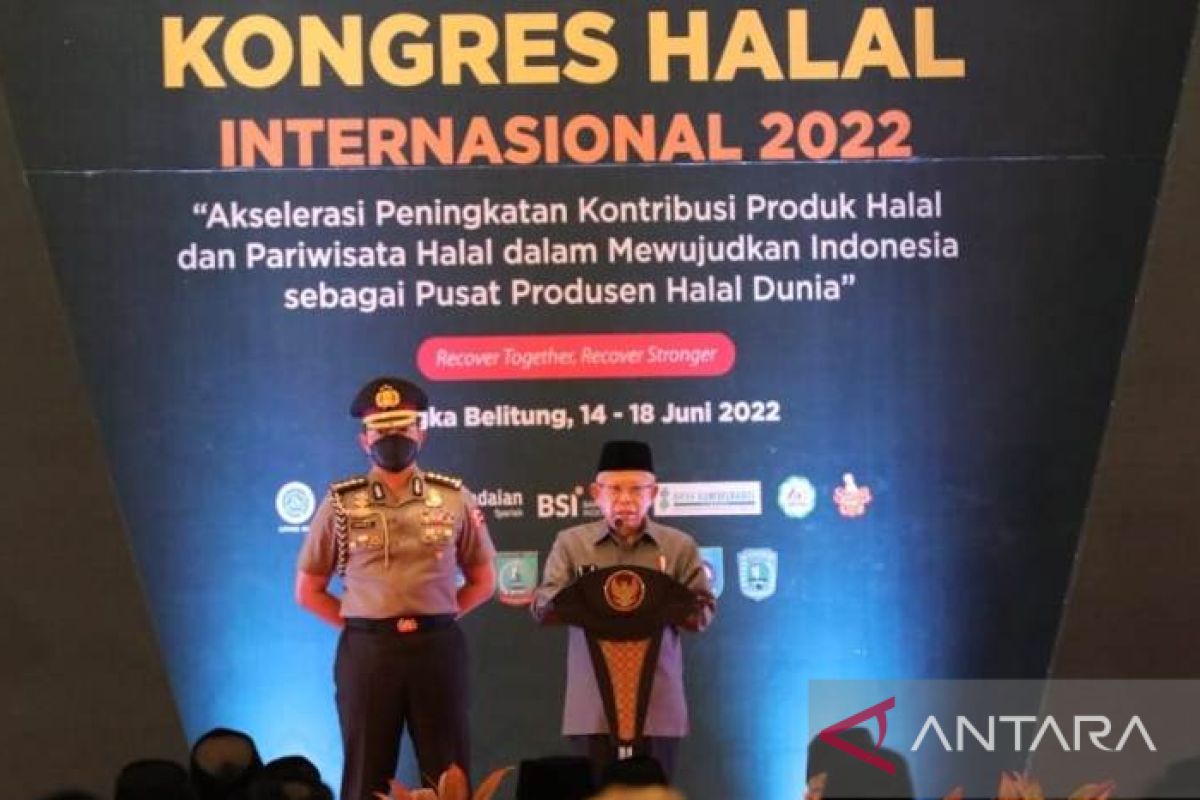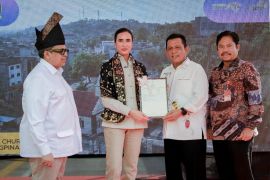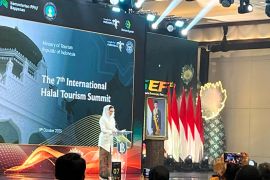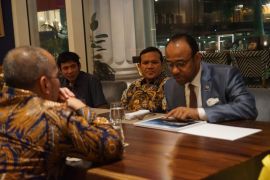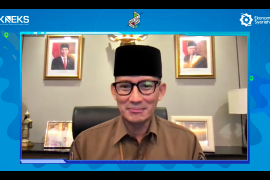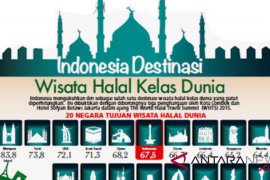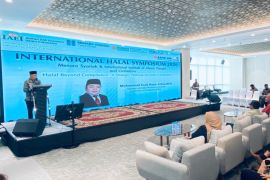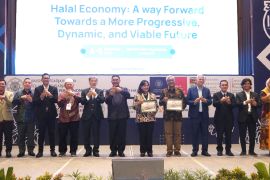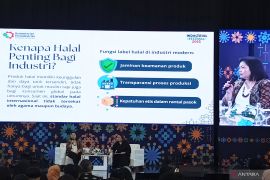MUI has a Professional Certification Agency that can train human resources to produce a domestically fabricated product of added valuePangkalpinang (ANTARA) - The 2022 International Halal Congress (KHI) held in Bangka Belitung Islands Province on June 14-15, 2022, provided strategic objectives to realize Indonesia's aspiration to become the world’s halal center in 2024.
The 2022 KHI, which was opened virtually by Vice President Ma’ruf Amin, brought "Accelerate the Contribution of Halal Products and Halal Tourism in Realizing Indonesia as a World Halal Producer Center" as the main theme. The congress was a form of support from the Indonesian Ulema Council (MUI) to the government in an effort to realize Indonesia as the world’s halal center.
Indonesia, in fact, has several advantages to become a leader in halal products and Islamic tourism on account of its abundant natural resources and superior human resources, with the world’s largest Muslim population.
Moreover, tourism destinations in the country, such as beaches, mountains, nature conservation, culinary arts, crafts, and historical places, draw several tourists to visit Indonesia. This potential is expected to accelerate development of the industry and halal tourism in order to encourage national economic growth after the COVID-19 pandemic.
Based on data from the Global Islamic Economy Report, Muslim consumers' spending on halal food and beverages, halal pharmaceuticals and cosmetics as well as Muslim-friendly tourism and halal lifestyles in 2019 reached US$2.2 trillion.
Meanwhile, consumption of halal products in Indonesia in 2019 reached US$144 billion, thereby making Indonesia the largest consumer in this sector. In the tourism sector, Indonesia emerged as the sixth-largest market, with a transaction value worth US$11.2 billion.
Related news: MUI invites people to help increase halal product availability
In the Muslim fashion sector, total consumption in Indonesia had reached US$16 billion. Meanwhile, Indonesia's halal pharmaceutical and cosmetic sector had been ranked sixth and second, with total expenditures of US$5.4 billion and US$4 billion, respectively.
Vice President Amin stated that Indonesia was not only the world's largest halal consumer, which accounted for 10 percent of the global halal industry market share, but was also a halal producer in the world.
The growth in global Islamic finance has been encouraged by a change in the consumers’ mindset that started to consume food, in accordance with religious belief, that is ethical, safe, and qualified. In fact, this is not only demanded by Muslim consumers but also non-Muslims living in non-Muslim countries.
"This makes halal products and sharia economics inclusive, not only for Muslims but also for various groups," Vice President Amin remarked while opening the 2022 International Halal Congress in Pangkalpinang.
In pursuit of realizing Indonesia's ambition to become the world's halal hub, it held several meetings themed "Move Faster to Realize Indonesia as a World Halal Center" that involved all coordinating ministries.
"I think today's congress will finalize and involve various business sectors to realize Indonesia as the world’s halal center,” he stated.
Related news: VP outlines strategies to encourage development of MSMEs
The vice president lauded and thanked MUI, as a pioneer of halal certification, which has been around for over three decades. The MUI halal standard has become a global standard and received recognition everywhere, with MUI representatives in Australia, Korea, and Taiwan. "This is a pioneering or extraordinary initiative and has a high value in the sight of Allah SWT," Amin stated.
Strong Reason
Secretary-General of the Indonesian Ulema Council (MUI) Buya Amirsyah Tambunan highlighted two strong reasons for Indonesia to become a world halal producer. First, Indonesia has abundant natural resources, for instance, in coffee and palm oil, to be processed in order to increase the added value of products. Secondly, Indonesia has qualified human resources.
"MUI has a Professional Certification Agency that can train human resources to produce a domestically fabricated product of added value,” Tambunan remarked.
Meanwhile, President Director of the Food, Drug and Cosmetic Research Institute (LPPOM) of MUI, Muti Arintawati, expressed her readiness to support the government in accelerating Indonesia's target to become the world's halal production center by 2024.
With its representative offices in all provinces in Indonesia, LPPOM MUI is able to help business actors, including Micro, Small, and Medium Enterprises (MSMEs), to develop products that meet the halal requirements.
LPPOM MUI, which has been established for 33 years, is given the mandate by MUI to license halal certification in Indonesia. However, after the enactment of the Halal Product Assurance Law (JPH), LPPOM MUI transformed into the first Halal Inspection Agency (LPH) recognized by the Halal Product Assurance Organizing Agency (BPJPH).
“Halal certification is a very important part of the halal ecosystem. We are all related to each other, as we cannot work alone,” Arintawati emphasized.
Acting Governor of Bangka Belitung Islands Ridwan Djamaluddin stated that the regional government was determined to become the center of the world's halal industry in order to improve the regional and national economy.
Bangka Belitung Islands is one of the regions with the best halal products in the world and having more than 2,200 halal-certified products.
This year, the region is targeting 100 thousand MSME products, restaurants, hotels, and financial services to have halal certificates in order to make the region the center of the world's halal industry and tourism.
Djamaluddin stated that the efforts to make Indonesia as the world’s halal center had become the focus of the government, policy makers, and organizations from various groups to implement this halal program.
“We have high optimism by looking at the development and increasing share of the global halal market,” he noted.
Related news: Several regions interested in creating halal industrial areas: gov't
Nine Halal Resolutions
The 2022 International Halal Congress in Pangkalpinang City, Bangka Belitung Islands Province, produced nine world halal resolutions in order to accelerate development of the halal industry and tourism in encouraging national economic growth.
Secretary of the 2022 KHI Steering Committee Rafiqul Umam Ahmad drew attention to the nine world halal resolutions comprising firstly, to increase development of the halal industry and halal tourism as an important pillar of national and global economic growth after the pandemic.
Second, realizing professional halal certification while upholding ethics. Third, agree to conduct a joint movement between the government and the community in improving guidance, assessment, and supervision of the competence and professionalism of halal certification governance, both at the national and international levels.
Fourth, improve the competence of human resources through the development of a market-oriented curriculum for the halal industry and halal tourism at all levels of education, especially universities, as a real contribution to the education sector to support Indonesia as the world's halal center.
Fifth, encourage the strengthening of collaboration and synergy between supply elements in the halal ecosystem that encompasses community participation, the halal industry, commercial finance, and social finance to attain strong connectivity and dependencies to increase the added value and accelerate the growth of competitive halal products oriented to national and export markets.
Sixth, encourage innovation and growth of the creative economy sector that is adaptive to digital technology at every stage of the halal value chain to accelerate and strengthen the integration of elements of the halal industry ecosystem and sharia financial economy.
Seventh, encourage adequate incentives for halal industry business actors, including MSMEs and Halal Industrial Estates, to stimulate the growth of export-oriented products and halal tourism industry players.
Eighth, encourage acceleration of the development of halal tourism by maintaining inclusiveness as the main attraction of tourism destinations for various tourists through strategic and comprehensive actions by stakeholders -- academics, businesses, community, government, and media -- using global benchmarks and leading practices in the tourism industry, especially the halal tourism industry to create sustainable halal tourism nationally and globally.
Ninth, encourage the MUI fatwa as a reference for global halal standards to combine all standards in an effort to increase the growth of trade in halal products and halal tourism.
Several aspects need to be prepared to realize Indonesia's aspiration to become the world’s halal center. With its potential from natural resources and superior human resources, it is believed that the target will be achieved.
Related news: Congress encourages Indonesia to lead halal product industry: MUI
Related news: VP optimistic of halal tourism recovering as COVID-19 cases decline
Editor: Fardah Assegaf
Copyright © ANTARA 2022
